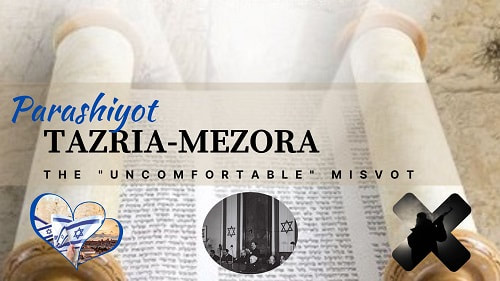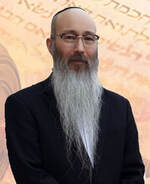|
By: HaRav Menashe Sasson מאת: הרב מנשה ששון In the aftermath of deadly terrorist attacks which are committed by Arab terrorists, the following question is always asked: “If the Israeli government had the will to stop the current terrorist attacks, and prevent future terrorist attacks, what could it do?” The answer to this question is not difficult, but it does need a little foundational information. A Torah command or Rabbinical obligation (as well as an act performed in conformance therewith) is known as a “misva” [מצוה]; the plural being “misvot” [מצוות]. For the purpose of a discussion of Parashat Mezora, there are two classes of misvot [מצוות]: “Comfortable Misvot,” that is, misvot which religious Jews openly discuss and generally enjoy performing and, on the other hand, “Uncomfortable Misvot,” those misvot which, typically, are not freely discussed. The Uncomfortable Misvot can further be divided into two subcategories: those which, typically, are not openly discussed, but are generally performed and those which, typically, are not openly discussed and which are seldom, if ever, performed, even though performance is possible. Parashat Mezora introduces us to the Uncomfortable Misva of Taharat HaMishpacha [טהרת המשפחה] (family purity) which, for reasons of modesty, is typically not discussed openly, especially in mixed company, but which is observed by religious couples. Examples of Uncomfortable Misvot which typically are not discussed and which are seldom, if ever performed, include self-defense, capital punishment, Yeshuv Eretz Yisra’el (the obligation to live in the Land of Israel), and expelling from Eretz Yisra’el those inhabitants of the land who claim a right thereto which is superior to that of the Jewish people. Regarding self-defense, Parashat Mishpatim informs us that: “If a thief is discovered while tunneling in, and he is struck and dies, there is no blood-guilt on his account. If the sun shone upon him, there is blood-guilt on his account.” Shemot 22:1-2. The Talmud explains that “[i]t is . . . assumed that before someone burglarizes a house, he [has already] decide[d] to kill the occupant, should it become necessary to do so. For this reason, the occupant is permitted to kill the burglar.” T.B., Masekat Sanhedrin, 72a. As for capital punishment, Parashat Emor states that “he who mortally strikes [יכה] any person shall surely be put to death.” Vayyiqra 24:17. Halakha which applies this pasuk goes into great detail regarding offenses which are punishable by death. Mishneh Torh, Hilchot Sanhedrin 6:1-9:3. As can readily be seen, the Torah does not merely authorize capital punishment, it mandates it in certain circumstances. Concerning Yishuv Eretz Yisra’el [ישוב ארץ ישראל], that is, the misva to settle in Eretz Yisra’el, also known as making Aliyah [עליה], which in Hebrew literally means to “go up,” the Talmud states: [T]he Sages taught: A person should always reside in Eretz Yisra’el, even in a city that is mostly populated by idolaters [gentiles], and he should not reside outside of Eretz Yisra’el, even in a city that is mostly populated by Jews. The reason is that anyone who resides in Eretz Yisra’el is considered as one who has a G-d, and anyone who resides outside of Eretz Yisra’el is considered as one who does not have a G-d. As it is stated: “[The purpose of the Exodus was” to give to you the land of Kena’an, to be your G-d.” T.B. Masechet Ketuvot, 110b, quoting Vayyiqra 25:38. Furthermore, the misva of living in Eretz Yisra’el is timeless. The Shulkhan Arukh states that: “If [a husband] proposes to ascend to Eretz Yisra’el and [the wife] does not want to [go], [the husband] must divorce her. . . . [And if the wife] proposes ascending [to Eretz Yisra’el] and [the husband] does not want to [go], he must divorce her.” Shulkhan Arukh, Even HaEzer 75:4. Lastly, regarding the expulsion from Eretz Yisra’el of those inhabitants of the Land who claim a right thereto which is superior to that of the Jewish people, HaShem, in His infinite wisdom, knew that the occupants of the Land would not voluntarily relinquish their control over Eretz Yisra’el. Thus, HaShem commanded that the Jewish people conquer the Land and expel the conquered inhabitants, and enjoined the Jewish people from entering into an agreement with conquered inhabitants that would allow them to remain in the Land. Beware of what I command you today. Behold, I drive out before you the Amorite, the Canaanite, the Hittite, the Perizzite, the Hivvite, and the Jebusite. Be vigilant lest you seal a covenant with the inhabitant[s] of the land to which you are to come, lest it be a snare among you. Shemot 34:11-17. The Halakha relating to non-Jews living in Eretz Yisra’el recognizes two classes of people: those who claim an ownership or similar interest in Eretz Yisra’el and those who do not claim any such interest. Regarding those who claim an ownership interest in the Land, the Torah is not merely referring to ancient civilizations who just happened to be occupying Eretz Yisra’el prior to the arrival of the Jewish people; rather, the Torah is referring to any people – for all time – who claim a legal right to Eretz Yisra’el. According to the Or HaHaim: “You are to drive out all of the inhabitants of the land. . . .” Even though the Torah says in Debarim 20:16 that “you must not allow a single soul [of the Canaanite nations to remain in Eretz Yisra’el], . . . the Torah does not speak of [only] the seven Canaanite nations[,] but [also] about others who lived among them. This is the reason the Torah chose its words carefully, i.e., “all the ones who dwell in the land,” that the Israelites were to drive out even those people who lived there who were not members of the seven [Canaanite] nations. Or HaHaim, commentary to Bamidbar 33:52. Likewise, Abarbanel said: Shemot 34:11-12 inform us that since Hashem is driving out the [Canaanite] nations, it would be improper for Yisra’el to forge a covenant with them. If a nobleman helps someone by fighting that person’s battles and banishing that person’s enemies, it would be immoral for that person to make peace with [those enemies] without [first obtaining the] nobleman’s permission. So, too, with HaShem driving out Yisra’el’s enemies, it is immoral for Yisra’el to enter into a treaty with them, for that would profane HaShem’s Glory. This is especially true considering that the treaty will not succeed. Because Yisra’el dispossessed them of what they believe to have been their land, there is no doubt that they will constantly seek to defeat and destroy Yisra’el. This is why it said, “[the Land] to which you are coming.” Since Yisra’el came to that Land and took it from its inhabitants, and because they feel that the Land has been stolen from them, how will they make a covenant of friendship with you? Rather the opposite will occur: “they will be a snare among you.” When war strikes you, they will join your enemies and fight you. Abarbanel, Commentary on Shemot 34:11-12. With this background, we now return to the question which was posed at the beginning of this article, to wit: “If the Israeli government had the will to stop the current terrorist attacks, and prevent future terrorist attacks, what could it do?”
The combination of these aforementioned policies, over the long-term, would both decrease the opportunity for non-Jewish Arabs to commit terrorist attacks, while also incentivizing them to emigrate to a another (likely Arab) country. All it would take to implement these reforms is the political will to do so, and faith that blessing will flow to the Jewish people for performing HaShem’s “Uncomfortable Misvots.” שבת שלום Shabbat Shalom! Copyright © The Israel Foundation. All Rights Reserved.
0 Comments
Your comment will be posted after it is approved.
Leave a Reply. |
THE ISRAEL FOUNDATION


